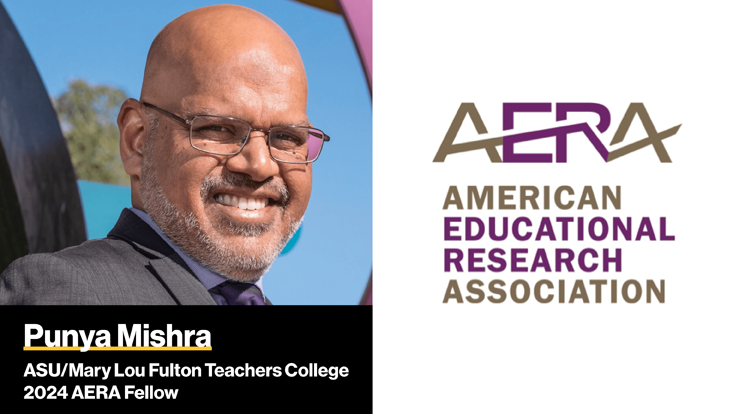Punya Mishra named 2024 AERA Fellow

Punya Mishra, a professor and associate dean of scholarship and innovation with Arizona State University’s Mary Lou Fulton Teachers College, is being recognized as a 2024 AERA Fellow by the American Educational Research Association.
Mishra is internationally recognized for his work on the theoretical, cognitive and social aspects related to the design and use of educational technologies, and he has become increasingly involved in research and initiatives that explore the role of generative artificial intelligence. His work includes securing over $11 million in grants, more than 200 published articles, and editing five books.
Current, emeritus and affiliated MFLTC faculty members previously inducted as AERA fellows include Alfredo Artiles, Dale Baker, Sasha Barab, David Berliner, Geoffrey Borman, Bryan Brayboy, Michelene Chi, Gustavo Fischman, Eugene García, James Gee, Gene Glass, Steve Graham, Karen Harris, Danielle McNamara, Joseph Ryan, Maria Teresa Tatto, and Patrick Thompson.
“The 2024 AERA Fellows join an exceptional group of scholars, and we are thrilled to welcome this year’s cohort at the ceremony,” said AERA Executive Director Felice J. Levine. “Their meaningful contributions to the education research field demonstrate the highest standards of academic excellence. They are most deserving of this honor.”
Nominated by their peers, the 2024 Fellows were selected by the Fellows Committee and approved by the AERA Council, the association’s elected governing body. Mishra will be inducted as a 2024 AERA Fellow during a ceremony at the organization’s Annual Meeting in Philadelphia on April 12.
An award-winning instructor connected with MLFTC’s division of educational leadership and innovation, Mishra also has an affiliate faculty position at The Design School. His work connects education with the domains of creativity, aesthetics and design, as highlighted in the Learning Sparks video series by ASU Learning Enterprise on topics that explore ways to redesign education for better outcomes. He leads a range of initiatives that advance equity-driven approaches to inter- and trans-disciplinary educational research, such as MLFTC’s Learning Future Collaboratives.
Mishra’s research in the area of technology integration led to the development of the Technological Pedagogical Content Knowledge framework, also known as TPACK. TPACK was introduced in 2006 by Mishra and Mathew J. Koehler, a professor of educational psychology and educational technology at Michigan State University, in a paper published in the Teachers College Record: Technological Pedagogical Content Knowledge: A new framework for teacher knowledge. This paper is arguably one of the most influential frameworks in educational technology integration, continuing to play a role in assessing the role of generative artificial intelligence to the learning process.
A TED-Ed educator, Mishra is ranked No. 48 among the top 200 university-based scholars (top 10 in psychology) who had the biggest influence on educational practice and policy (2024 RHSU Edu-Scholar Public Influence Rankings), and he is listed among the top 2 percent of most widely cited scientists worldwide (Stanford/Elsevier, 2022). He hosts the award-winning webinar series Silver Lining for Learning and the Learning Futures podcast, and maintains his own blog that captures his range of research and interests.